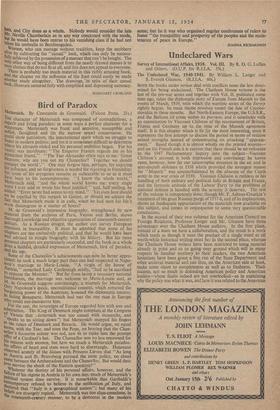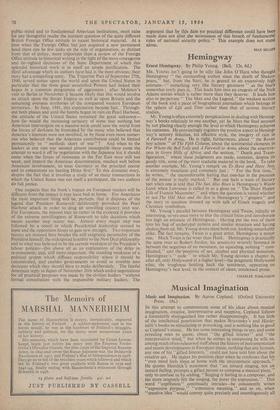Undeclared Wars
Survey of International Affairs, 1938. Vol. III. By R. D. G. Laffan and Others. (O.U.P. for R.I.I.A. 55s.)
The Undeclared, War, 1940-1941. By William L. Langer and S. Everett Gleason. (R.I.I.A. 60s.)
Bout the books under review deal with conflicts none the less deter- mined for being undeclared. The Chatham House volume is the last of the pre-war series and together with Vol. II, published some time ago, takes the diplomatic story of Europe from Munich to the events of March, 1939, with which the wartime series of the Survey rightly begins. Its main theme revolves round the fate of Czecho- slovakia in those months. But North-Eastern Europe, the U.S.S.R., and the Balkans all come within its purview, and it concludes with an examination by Viscount Chilston of the rearmament of Britain, France and Germany up to the time of the Munich agreement itself. It is this chapter which is by far the most interesting, since it represents the first attempt to discuss the period in terms of relative armed strengths instead of concentrating on attacking "appease- ment." Based though it is almost wholly on the printed sources— and on the French side it is curious that there should be no reference to the 1947 Parliamentary inquiry into the subject—Viscount Chilston's account is both impressive and convincing: he leaves open, however, how far our catastrophic situation in the air and in anti-aircraft defences in 1938 which provided the strongest reason for "Munich" was counterbalanced by the absence of the Czech army in the war crisis of 1939. Viscount Chilston is ruthless in his handling of both military and political folly in Britain and France, and the fantastic attitude of the Labour Party to the problems of national defence is handled with the severity it deserves. The rest of the volume is competently done; though Mr. F. Ashton-Gwatkin's treatment of the great Russian purge of 1937-8, and of its implications, shows an inadequate appreciation of the materials now available on this subject, and comes in consequence to sonic very questionable conclusions.
In the second of their two volumes for the American Council on Foreign Relations, Professor Langer and Mr. Gleason have three advantages over the Chatham House authors. In the first place, instead of a team we have a collaboration, and the result is a work which reads as though it were the product of a single mind as all worth-while historical writing must be: in the second place, whereas the Chatham House writers have been restricted to using material already in print and so to going over ground which will in many respects be familiar territory to their readers, the two American historians have been given a free run of the State Department and other archival material and can thus, on the American side at least, make some claim to completeness as well as to freshness. Their success, not so much in defending American policy and American leaders—whose faults indeed are not overlooked—as in explaining w ty the policy was what it was, and how it was related to the American
public mind and to fundamental American institutions,. must raise for any thoughtful reader the insistent question of the quite different British Foreign Office attitude to recent historical material. At a time when the Foreign Office has just acquired a new permanent head there can be few tasks on the side of organisation, as distinct from that of policy, more important than a review of the Foreign Office attitude to historical writing in the light of the more courageous and far-sighted decisions of the State Department of which this splendid historical work is in itself an ample justification. The third advantage which its authors have had is the most obvious; their story has a compelling unity. The Tripartite Pact of September 27th, 1940, served notice upon the world and upon the United States in particular that the three great unsatisfied Powers had linked their hopes in a common programme of aggression ; after Molotov's visit to Berlin in November it became likely that this would involve an attack upon the Soviet Empire as well as upon Britain and the remaining overseas territories of the conquered western European territories. In June, 1941, this expectation became fact. Through- out both phases and until the bombs began to rain on Pearl Harbour, the attitude of the United States remained the great unknown— how far would the increasing certainty of some that nothing but American intervention on a massive scale could save the world from the forces of darkness be frustrated by the many who believed that America's interests were not involved, or by those even more numer- ous who believed that the American contribution could be limited permanently to " methods short of war" ? And when to the leaders at any rate war seemed almost inescapable there came the attempt to ward it off by negotiation with the Japanese lest it should come when the forces of resistance in the Far East were still too weak, and imperil the American determination, reached well before American involvement, to treat Germany as the principal enemy and to concentrate on beating Hitler first.- To this dramatic story, despite the fact that it involves a study of so many transactions in which the United States was not itself a participant, the two authors do full justice.
One suspects that the book's impact on European readers will be different from the impact it may have had at home. For Americans the most important thing will be, perhaps, that it disposes of the legend that President Roosevelt deliberately provoked the Pearl Harbour attack in order to drag an unwilling country into war. For Europeans, the interest may lie rather in the evidence it provides of the extreme unwillingness of Roosevelt to take decisions which meant another step nearer war. Almost every major step was followed by a recoil in which Presidential leadership seemed to lapse and the opposition forces to gain new strength. Two important factors are stressed here besides the still enigmatic personality of the President himself; the widespread hostility to the New Deal philosophy and to what was believed to be the current weakness of the President's labour policies—this above all as an explanation of the delay in re-armament; and, still more.impol tant, the standing weakness of a political system wh:vh diffuses responsibility where it should be concentrated, and enables governments to avoid or stumble into decisions which they should Have to make deliberately. The fateful American reply to Japan of November 26th which ended negotiations for all practical purposes was made by the civilian leaders "without formal consultation with the responsible military leaders: The argument that by this date no practical difference could have been made does not alter, Ike seriousness of this breach of fundamental rules of national security policy." This example does not stand alone.
MAX BELOPF



































 Previous page
Previous page